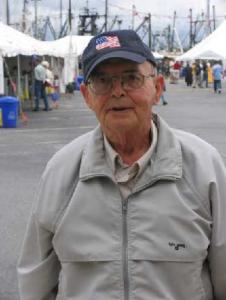Leslie Trott

The Working Waterfront Festival Community Documentation Project
This project documents the history and culture of the commercial fishing industry and other port trades. The project began in 2004 in conjunction with the Working Waterfront Festival, an annual, educational celebration of commercial fishing culture which takes place in New Bedford, MA. Interviewees have included a wide range of individuals connected to the commercial fishing industry and/or other aspects of the port through work or familial ties. While the majority of interviewees are from the port of New Bedford, the project has also documented numerous individuals from other ports around the country. Folklorist and Festival Director Laura Orleans and Community Scholar and Associate Director Kirsten Bendiksen are project leaders. The original recordings reside at the National Council for the Traditional Arts in Maryland with listening copies housed at the Festival's New Bedford office.
Janice Gadaire Fleuriel
Leslie Trott is a retired fisherman of European American descent, who spent a significant part of his life fishing from the port of New Bedford. Born in New Bedford but raised in Nantucket, Trott comes from a long line of fishermen, with his father and great grandfather both having been involved in the industry. Trott began his fishing career at the age of sixteen and continued for forty-three years, with a brief stint in the merchant marine and the Army. His father skippered the Hazel Jackson, and Trott himself has worked on several boats including the Eager, Annie Louise, Rush, and North Sea. Trott's extensive experience and knowledge provide a unique perspective on the changes and challenges in the fishing industry over the years.
Scope and Content Note:
This interview with Leslie Trott, conducted by Janice Gadaire Fleuriel on September 28, 2008, provides a detailed account of Trott's life and experiences as a fisherman. The interview covers a wide range of topics including Trott's family background in fishing, his early years in the industry, the boats he worked on, and the various fishing methods and equipment used. Trott discusses the challenges of weather and navigation at sea, recounting instances of getting caught in storms and the evolution of navigation equipment over the years. He also touches on the personal sacrifices made by fishermen, such as missing family events and the difficulty for families to adjust to the lifestyle. The interview also delves into the changes in the fishing industry, with Trott expressing his views on regulations and the impact on fishermen. He also mentions the transition from wooden to steel boats, the routes taken to transport boats, and the shift in fishing practices. Trott's interview provides valuable insights into the life of a fisherman, the evolution of the fishing industry, and the impact of regulations and technological advancements on the profession.
Please Note: The oral histories in this collection are protected by copyright and have been created for educational, research and personal use as described by the Fair Use Doctrine in the U.S. Copyright law. Please reach out Voices@noaa.gov to let us know how these interviews are being used in your research, project, exhibit, etc. The Voices staff can help provide other useful resources related to your inquiry.
The NOAA mission is to understand and predict changes in climate, weather, oceans, and coasts, to share that knowledge and information with others, and to conserve and manage coastal and marine ecosystems and resources. The Voices Oral History Archives offers public access to a wide range of accounts, including historical materials that are products of their particular times, and may contain offensive language or negative stereotypes.
Voices Oral History Archives does not verify the accuracy of materials submitted to us. The opinions expressed in the interviews are those of the interviewee only. The interviews here have been made available to the public only after the interviewer has confirmed that they have obtained consent.
